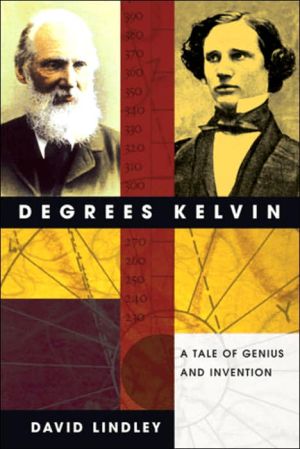

 |

|

The average rating for Degrees Kelvin: A Tale of Genius, Invention, and Tragedy based on 2 reviews is 4 stars.
Review # 1 was written on 2016-07-11 00:00:00 Chancellor Maryland Chancellor MarylandWilliam Thomson, Lord Kelvin, was one of the great scientists of the 19th century. In his own time, he was at the pinnacle of scientific prestige. He was the first scientist ever ennobled in the United Kington. His reputation, however, has fallen off considerably since his own time, and he mostly appears in the history of science as a cranky old man, opposing these new-fangled things like nuclear physics and relativity. This biography paints a picture of the man, with particular emphasis on trying to understand the shifts in his reputation. I liked the book quite a bit, and I liked the new perspective it gave me on 19th century science. The book paints a generally sympathetic portrait of Thomson. The overall view it gave me is that he was a tremendously talented scientist, who did a very great deal of good, but whose reputation has suffered for three reasons: (1) he was an un-systematic thinker, poor at tracing which ideas he got from where; as a result, it's hard to give him credit for any large coherent breakthrough. (2) He devoted much of his energies to applied science, which gets less credit and memory than fundamental breakthroughs (3) Kelvin is remembered today primarily for his work on thermodynamics. It was in honor this work that he had the SI unit of temperature named after him. As this biography discussed in detail, his legacy here is mixed. He was one of the first people in Europe to understand the importance of Carnot's work, to formulate a concept of entropy, and to discover the existence of an absolute thermodynamic zero point. However, it is not entirely clear which ideas were originally his and which he had adopted from others. Kelvin was a great borrower and sharer of ideas, without regard to original invention. Moreover, he had the bad habit, when he changed his mind, of denying that he had done so and claiming that he had that thought in mind all along. Kelvin was fair-minded and generous enough to never object when others took credit for his ideas. For instance, he was the person who had suggested to George Stokes the theorem that now has Stokes' name. Something that this biography emphasizes, which I had never heard before, is that Kelvin was one of the inventors of "applied physics." He was one of the first physicists to really push home the claim that the laws of classical physics can be used to resolve messy engineering questions. He devoted a great deal of time and energy to problems like engineering underwater telegraph cables, understanding the stability of ships, understanding and correcting for the deflection of magnetic compasses, and so forth. He thought of this applied work as having equal importance as theoretical inquiries. This was work of immense social value; he probably saved hundreds of lives with his compass work. Moreover, the project of tying together physics and engineering has been tremendously fruitful in engineering, mathematics and physics. And Kelvin deserves a great deal of the credit for pioneering this sort of inquiry. Kelvin lived a very long time, and was engaged in a wide range of scientific topics. As a result, he was wrong about several major topics, notably aether and the age of the earth. Our current theories on these topics are some the most-celebrated achievements of the early 20th century, and so Kelvin necessarily enters the story as the mistaken representative of the old guard. He was in the old guard and he was wrong. But he was wrong for perfectly good reasons. It was a real advance to compute a bound on the age of the earth, based on its stored internal heat, and then to show that this was a problem for contemporary geography. Showing that disparate theories are incompatible is one of the ways science advances. Similarly with aether. Thomson spent decades trying to construct a mechanical theory of electromagnetism based on vibrations of an aether. This didn't work, and couldn't have worked, but the only way science advances is when lines of inquiry and possible theories are tested and tried out. Somebody had to give aether a fair go before scientists were justified in rejecting in, and it's Thomson's bad luck that he wound up taking the hit for that. |
Review # 2 was written on 2018-06-23 00:00:00 Gerald Copeland Gerald CopelandA true Victorian genius, both as scientist and inventor, Lindley highlights the many things Kelvin got many things right while not hiding those few he did not. |
CAN'T FIND WHAT YOU'RE LOOKING FOR? CLICK HERE!!!